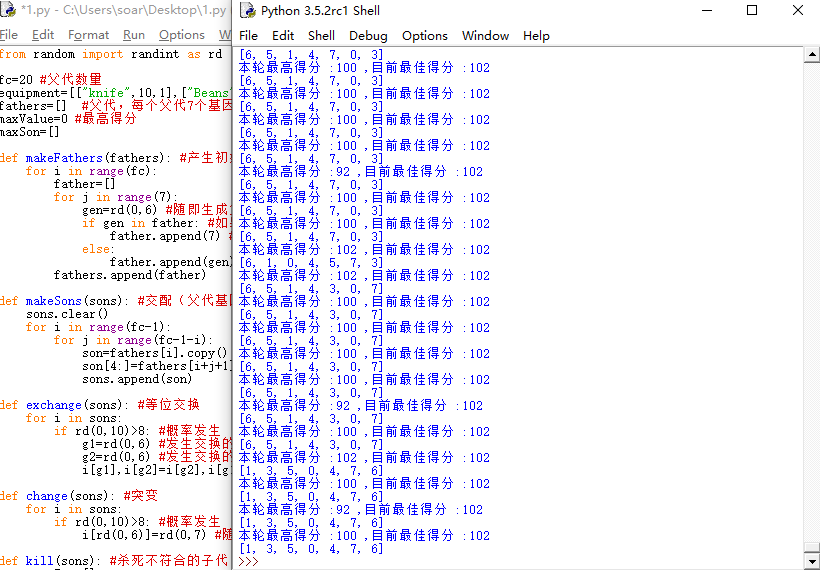请问如何用python结合遗传算法和多目标优化计算得出最佳结果?
假设场景是一个人进入荒岛,只能带20单位重量的东西。可选物品有两种属性,分别是重量和重要性。二维列表如下(第一位是物品名称,第二位是重要性,第三位是重量):
[["knife","10","1"],["Beans","20","5"],["Potatoes","15","10"],["Onions","2","1"],["Sleeping Bag","30","7"],["Rope","10","5"],["Compass","30","1"]]
每种物品最多带一个,但是所带物品总数无限制。最终要求得出最佳物品携带方案。
代码
from random import randint as rd
fc=20 #父代数量
equipment=[["knife",10,1],["Beans",20,5],["Potatoes",15,10],["Onions",2,1],["Sleeping Bag",30,7],["Rope",10,5],["Compass",30,1]]
fathers=[] #父代,每个父代7个基因位(因为一共7个物品)。
maxValue=0 #最高得分
maxSon=[]
def makeFathers(fathers): #产生初始父代
for i in range(fc):
father=[]
for j in range(7):
gen=rd(0,6) #随即生成父代基因位
if gen in father: #如果该基因已存在
father.append(7) #则添加一个7号基因(即不存在,表示此位置不带物品)
else:
father.append(gen) #否则添加该随即基因
fathers.append(father)
def makeSons(sons): #交配(父代基因交换)
sons.clear()
for i in range(fc-1):
for j in range(fc-1-i):
son=fathers[i].copy()
son[4:]=fathers[i+j+1][4:]
sons.append(son)
def exchange(sons): #等位交换
for i in sons:
if rd(0,10)>8: #概率发生
g1=rd(0,6) #发生交换的基因位1
g2=rd(0,6) #发生交换的基因位2
i[g1],i[g2]=i[g2],i[g1]
def change(sons): #突变
for i in sons:
if rd(0,10)>8: #概率发生
i[rd(0,6)]=rd(0,7) #随即一位的基因变为随机
def kill(sons): #杀死不符合的子代
sonsTmp=[]
for i in sons:
son=i.copy()
son.sort()
flag=0 #基因重复标记
weight=0 #重量计数
for j in range(6):
if son[j]==son[j+1] and son[j]!=7:
flag+=1
if son[j]!=7:
weight+=equipment[son[j]][2] #基因位重量累加
if son[6]!=7:
weight+=equipment[son[6]][2]
if not (flag>0 or weight>20): #如果不出现重复或超重
sonsTmp.append(i)
sons.clear()
for i in sonsTmp:
sons.append(i)
def rank(sons): #子代评分
global maxValue
global maxSon
values=[]
for i in sons:
value=0 #初始评分
for j in range(7):
if i[j]!=7:
value+=equipment[i[j]][1] #物品得分累加
if value>120:
print(i)
i.append(value) #为子代添加评分
values.append(value) #为总评分列表添加评分
values.sort() #评分排序
if maxValue<values[-1]:
maxValue=values[-1]
sonsTmp=[]
for i in sons: #将评分低于第20高得分的子代杀死
if i[-1]>values[-fc]:
sonsTmp.append(i)
if i[-1]==maxValue:
maxSon=i[:-1].copy()
print("本轮最高得分 :%d ,目前最佳得分 :%d" % (values[-1],maxValue))
print(maxSon)
fathers=sonsTmp.copy() #剩余子代作为新父代
def main():
sons=[]
makeFathers(fathers)
for i in range(100): #100次迭代
makeSons(sons)
exchange(sons)
change(sons)
kill(sons)
rank(sons)
main()
运行结果
实际上102就是最佳值,因为样本小,好多时候一上来就是最佳值。
你可以使用之前的那个二进制位的遗传算法的框架,只是这个程序里01分别表示某种物品是否需要,优化目标是比较计算出重要性最大。